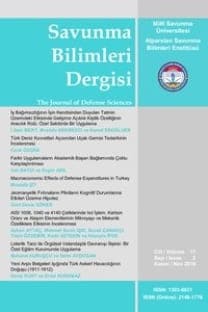Volga Almanları: 250 Yıllık Süreçte Yaşanan Göçler, Sürgünler ve Alman Diasporasının Kazakistan-Almanya İlişkilerine Etkileri
Volga Germans: Migrations, Deportation in 250 Years Period And The Impacts of German Dıaspora on Kazakhstan-Germany Relation
___
- Aifeld, P. (2010). Russlandeutsche-eine autobiographische studie vor historischem Hintergrund. www.wolgadeutschen.net adresinden alınmıştır.
- Auswaertiges Amt. Almanya Dışişleri Bakanlığı resmi internet sitesi. 15 Aralık 2014'te www. auswaertiges-amt.de adresinden alınmıştır.
- Bartlett, R. (1979). Human capital: The settlement of foreigners in Russia 1762-1804. Cambridge: Cambridge University Press.
- Darieva, T. (2005). Recruiting for the nation: Post-Soviet transnational migrants in Germany and Kazakhstan. www.siberian-studies.org adresinden alınmıştır.
- Eisfeld, A. (2011). Die Auswirkungen von deportationen auf späteren generationen der Deutschen in Russland. Stiftung Gedenkstätten, Sachsen Anhalt.
- Eisfeld, A. (2003). Die Aussiedlung der Deutschen aus der Wolgarepublik 1941- 195. Osteuropa-Institut München.
- Eisfeld, A. (2012). 200 Jahre Ansiedlung der Deutschen im Schwarzmeergebiet. Landsmannschaft der Deutschen aus Russland e.V.
- Gredinger, G. (2010). Identity beyond the Nation State: the case of the Russian Germans. Centers for German and European Studies, Working Paper.
- Güler, N. (2002). Kazakistan-Kırgızistan Özel. Avrasya Dosyası, Kış 2001- 2002, Cilt 7, Sayı 4, s. 162-176.
- Hecker, H. (1998). Die Deutschen in Russischen Reich, in der Sowjetunion und ihren Nachfolgestaaten. Historische Landeskunde, Deutsche Geschichte im Osten 2, Köln.
- İnalcık, H. (2014). Devlet-i Aliyye, Osmanlı İmparatorluğu Üzerine Araştırmalar- II, s. 12-1. Türkiye İş Bankası Kültür Yayınları.
- Kinville, P.J. (2013). Interwar Soviet Nationalities Policy: The Case of Volga Germans. Yayınlanmamış Yüksek Lisans Tezi. Central European University Nationalism Studies Program, Budapest.
- Krieger, V. (1993). Deutsche Präzens in Kasachstan zur Zarenzeit. Osteuropa- Institut München.
- Lee, R. (2003). The demographic transition: Three centuries of fundamental change. Journal of Economic Perspectives, Volume 17, Number 4.
- Martin, T. (2002). An affirmative action empire: Nations and nationalism in the Soviet Union. 1923-1939, London: Cornell University Press.
- Mukhina, I. (2007). The Germans of The Soviet Union. New York. Routledge Press.
- Neutatz, D. (1994). Deutsche Bauern in den Steppen Rußlands. Die Wolgaund Schwarzmeerdeutschen von der Ansiedlung bis zur Deportation. Mit einem vergleichenden Blick auf die Donauschwaben. In: Deutsche im Osten. Geschichte, Kultur, Erinnerungen. Hg. v. Deutschen Historischen Museum. Berlin, München 1994, S. 129- 148.
- Oltmer, J. (2014). Heimkehr? Volksdeutsche fremder Staatsangehörigkeit aus Ost- Ostmittel- und Südosteuropa im deutschen Keiserreich und in der Weimarer Republik. Europäische Geschichte Online. 09 Aralık 2014 tarihinde www.ieg-ego.eu. adresinden alınmıştır.
- Özcan, V. (2004). Germany: Immigration in transition. Migration Information Source. 12 Aralık 2014 tarihinde www.migrationinformation.org. adresinden alınmıştır.
- Peyrouse, S. (2009). Business and trade relationships between the EU and Central Asia. EU-Centalasia Monitoring, Working Paper 01.
- Pohl, O. (2009). Volk auf dem Weg: Transnational migration of the Russian- Germans from 1763 to the present day. American University of Central Asia Studies in Ethnicity and Nationalism: Vol. 9, No. 2.
- Pohl, O. (2014). Colonialism in one Country: The deported peoples in the USSR as an example of internal colonialism. Journal of Race, Ethnicity and Religion. Volume 5, Issue 7. Sopher Press.
- Safran, W. (1991). Diasporas in modern societies: Myths of Homeland and Return. University of Colorado.
- Schmaltz, J. E. (2014). Carrots and sticks and demonstrations: Yuri Andropov's Failed Autonomy Plan for Soviet Kazakhstan's Germans, 1976-1980. The Eurasia Society Journal of Great Britain and Europe, Vol.3.No.1.
- Sunderland, W. (2004). Taming the wild field, colonization and Empire on the Russian Steppe. Cornell University Press.
- Türk, F. (2010). Boris Yeltsin döneminde Rus-Alman ilişkileri. Fırat Üniversitesi Sosyal Bilimler Dergisi Cilt:20, Sayı:1.
- Yiğit, A. (2001). Kazakistan'ın değişen etnik yapısı. Fırat Üniversitesi Sosyal Bilimler Dergisi Cilt:10, Sayı:2.
- Weber, M. (2009). Deutsche Minderheiten in der europäischen Siedlungsgeschichten, Aussiedler-und Minderheitenpolitik in Deutschland. Oldenburg Verlag München.
- ISSN: 1303-6831
- Yayın Aralığı: 2
- Başlangıç: 2002
- Yayıncı: Milli Savunma Üniversitesi Alparslan Savunma Bilimleri ve Millî Güvenlik Enstitüsü
İnsansız Hava Aracı (İHA) Sistemlerinin Hava Hukuku Bakımından İncelenmesi
Irak Şam İslam Devleti (IŞİD): Gücü ve Geleceği
Şemsettin ERDOĞAN, Ergün DELİGÖZ
El Nusra CEPHESİ, Aytekin TERKAN VEDAT ZAYIF, İsmail YAŞAR
Sovyetler Birliği'nin Dağılması Karşısında Sovyet İnsanının Tepkisizliğinin Nedenleri
